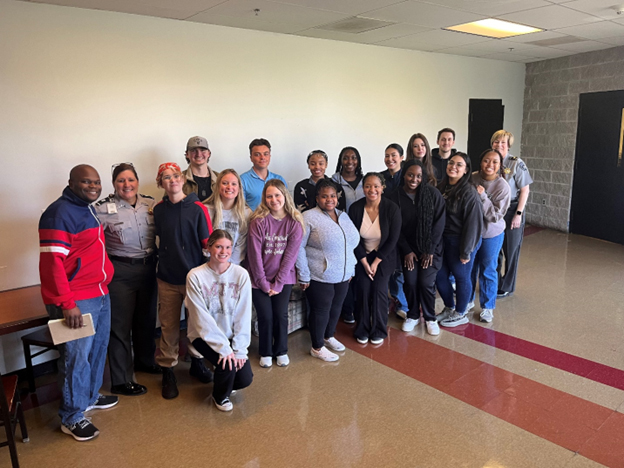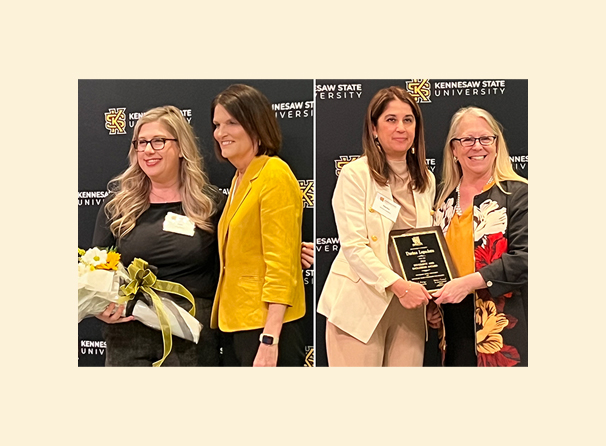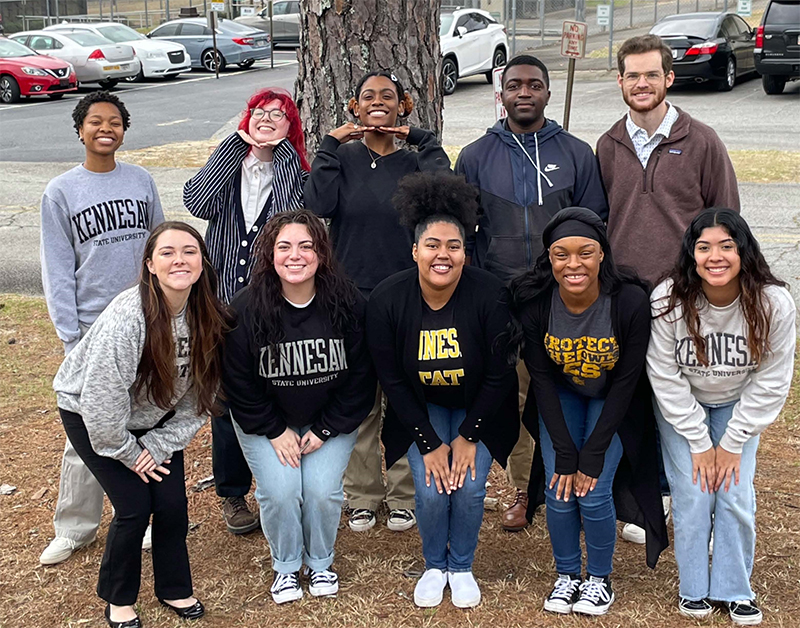Department of Sociology and Criminal Justice
Welcome to the Department of Sociology and Criminal Justice at Kennesaw State University! We offer majors in Sociology and Criminal Justice, in both traditional and fully online formats. The department also offers a Masters in Criminal Justice. As well, the department offers minors in Criminal Justice, Criminology, Gerontology, Medical Sociology, and Sociology. The department actively promotes experiential learning. Sociology and Criminal Justice undergraduate majors are required to complete an internship, cooperative studies, or a study abroad. We also value and promote global learning; our faculty have offered study abroad opportunities in Ghana, Germany and Netherlands, and South Korea and Thailand. Our department houses the official journal of the Georgia Sociological Association, the Journal of Public and Professional Sociology.
Recent News + More News
 Beyond Scared Straight? Not quite! Professor Fields and CRJU 3332 Students Toured Jails and Prisons for a Taste of Reality
Beyond Scared Straight? Not quite! Professor Fields and CRJU 3332 Students Toured Jails and Prisons for a Taste of Reality Dr. Jason Muller Article Published in Sage Journals
Dr. Jason Muller Article Published in Sage Journals Dr. Sara Evans and Dr. Darina Lepadatu Receive Faculty Awards
Dr. Sara Evans and Dr. Darina Lepadatu Receive Faculty Awards Students and Faculty Travel to Macon YDC
Students and Faculty Travel to Macon YDC
Upcoming Events
+More EventsMarch 2024
- Sunday
- Monday
- Tuesday
- Wednesday
- Thursday
- Friday
- Saturday
-
25Sunday
-
26Monday
-
27Tuesday
-
28Wednesday
-
29Thursday
- 1Friday
- 2Saturday
- 3Sunday
- 4Monday
- 5TuesdayChief Gina V. Hawkins12:30pm
- 6WednesdayWhat's Really Going On With the Crime Rate?11:00am
- 7Thursday
- 8FridayMSCJ Virtual Information Session8:00am
- 9Saturday
- 10Sunday
- 11Monday
- 12Tuesday
- 13Wednesday
- 14Thursday
- 15Friday
- 16Saturday
- 17Sunday
- 18Monday
- 19Tuesday
- 20Wednesday
- 21Thursday
- 22Friday
- 23Saturday
- 24Sunday
- 25Monday
- 26Tuesday
- 27Wednesday
- 28Thursday
- 29FridayMSCJ Virtual Information Session12:00pm
- 30Saturday
- 31Sunday
- 1Monday
- 2Tuesday
- 3Wednesday
- 4Thursday
- 5Friday
- 6Saturday
April 2024
- Sunday
- Monday
- Tuesday
- Wednesday
- Thursday
- Friday
- Saturday
-
31Sunday
- 1Monday
- 2TuesdayFirst Tuesday Luncheon Series: Finding the Movement in Social Movements12:30pm
- 3Wednesday
- 4Thursday
- 5Friday
- 6Saturday
- 7Sunday
- 8Monday
- 9Tuesday
- 10Wednesday
- 11Thursday
- 12Friday
- 13Saturday
- 14Sunday
- 15Monday
- 16TuesdayPrison Education Lunch and Learn12:30pm
- 17Wednesday
- 18ThursdayMSCJ Virtual Information Session5:30pm
- 19Friday
- 20Saturday
- 21Sunday
- 22Monday
- 23Tuesday
- 24Wednesday
- 25Thursday
- 26Friday
- 27Saturday
- 28Sunday
- 29Monday
- 30Tuesday
- 1Wednesday
- 2Thursday
- 3Friday
- 4Saturday
May 2024
- Sunday
- Monday
- Tuesday
- Wednesday
- Thursday
- Friday
- Saturday
-
28Sunday
-
29Monday
-
30Tuesday
- 1Wednesday
- 2Thursday
- 3Friday
- 4Saturday
- 5Sunday
- 6Monday
- 7Tuesday
- 8Wednesday
- 9Thursday
- 10FridayMSCJ Virtual Information Session8:00am
- 11Saturday
- 12Sunday
- 13Monday
- 14Tuesday
- 15Wednesday
- 16Thursday
- 17Friday
- 18Saturday
- 19Sunday
- 20Monday
- 21Tuesday
- 22Wednesday
- 23Thursday
- 24Friday
- 25Saturday
- 26Sunday
- 27Monday
- 28Tuesday
- 29Wednesday
- 30Thursday
- 31Friday
- 1Saturday
June 2024
- Sunday
- Monday
- Tuesday
- Wednesday
- Thursday
- Friday
- Saturday
-
26Sunday
-
27Monday
-
28Tuesday
-
29Wednesday
-
30Thursday
-
31Friday
- 1Saturday
- 2Sunday
- 3Monday
- 4Tuesday
- 5Wednesday
- 6Thursday
- 7Friday
- 8Saturday
- 9Sunday
- 10Monday
- 11Tuesday
- 12WednesdayMSCJ Virtual Information Session12:00pm
- 13Thursday
- 14Friday
- 15Saturday
- 16Sunday
- 17Monday
- 18Tuesday
- 19Wednesday
- 20Thursday
- 21Friday
- 22Saturday
- 23Sunday
- 24Monday
- 25Tuesday
- 26WednesdayMSCJ Virtual Information Session12:00pm
- 27Thursday
- 28Friday
- 29Saturday
- 30Sunday
- 1Monday
- 2Tuesday
- 3Wednesday
- 4Thursday
- 5Friday
- 6Saturday
July 2024
- Sunday
- Monday
- Tuesday
- Wednesday
- Thursday
- Friday
- Saturday
-
30Sunday
- 1Monday
- 2Tuesday
- 3Wednesday
- 4Thursday
- 5Friday
- 6Saturday
- 7Sunday
- 8Monday
- 9Tuesday
- 10Wednesday
- 11Thursday
- 12Friday
- 13Saturday
- 14Sunday
- 15Monday
- 16Tuesday
- 17Wednesday
- 18Thursday
- 19Friday
- 20Saturday
- 21Sunday
- 22Monday
- 23Tuesday
- 24Wednesday
- 25Thursday
- 26Friday
- 27Saturday
- 28Sunday
- 29Monday
- 30Tuesday
- 31Wednesday
- 1Thursday
- 2Friday
- 3Saturday
August 2024
- Sunday
- Monday
- Tuesday
- Wednesday
- Thursday
- Friday
- Saturday
-
28Sunday
-
29Monday
-
30Tuesday
-
31Wednesday
- 1Thursday
- 2Friday
- 3Saturday
- 4Sunday
- 5Monday
- 6Tuesday
- 7Wednesday
- 8Thursday
- 9Friday
- 10Saturday
- 11Sunday
- 12MondayFirst Day of ClassesAll Day
- 13Tuesday
- 14Wednesday
- 15ThursdaySCJ Faculty Meeting12:30pm
- 16FridaySCJ Faculty Meeting12:30pm
- 17Saturday
- 18Sunday
- 19Monday
- 20Tuesday
- 21WednesdayMSCJ Virtual Information Session6:00pm
- 22Thursday
- 23Friday
- 24Saturday
- 25Sunday
- 26Monday
- 27Tuesday
- 28Wednesday
- 29Thursday
- 30Friday
- 31Saturday
September 2024
- Sunday
- Monday
- Tuesday
- Wednesday
- Thursday
- Friday
- Saturday
- 1Sunday
- 2MondayLabor Day HolidayAll Day
- 3TuesdayLuncheon and Presentation with Rashawn Ray12:30pm
- 4Wednesday
- 5Thursday
- 6Friday
- 7Saturday
- 8Sunday
- 9Monday
- 10Tuesday
- 11Wednesday
- 12Thursday
- 13Friday
- 14Saturday
- 15Sunday
- 16Monday
- 17TuesdaySCJ Faculty Meeting12:30pm
- 18Wednesday
- 19Thursday
- 20Friday
- 21Saturday
- 22Sunday
- 23Monday
- 24Tuesday
- 25Wednesday
- 26Thursday
- 27Friday
- 28Saturday
- 29Sunday
- 30Monday
- 1Tuesday
- 2Wednesday
- 3Thursday
- 4Friday
- 5Saturday
October 2024
- Sunday
- Monday
- Tuesday
- Wednesday
- Thursday
- Friday
- Saturday
-
29Sunday
-
30Monday
- 1TuesdayFirst Tuesday Luncheon Series12:30pm
- 2Wednesday
- 3Thursday
- 4Friday
- 5Saturday
- 6Sunday
- 7Monday
- 8Tuesday
- 9WednesdayGSA ConventionAll Day
- 10ThursdayGSA ConventionAll Day
- 11FridayGSA ConventionAll Day
- 12Saturday
- 13Sunday
- 14Monday
- 15Tuesday
- 16Wednesday
- 17ThursdaySCJ Faculty Meeting12:30pm
- 18Friday
- 19Saturday
- 20Sunday
- 21Monday
- 22Tuesday
- 23Wednesday
- 24Thursday
- 25Friday
- 26Saturday
- 27Sunday
- 28Monday
- 29Tuesday
- 30Wednesday
- 31Thursday
- 1Friday
- 2Saturday
November 2024
- Sunday
- Monday
- Tuesday
- Wednesday
- Thursday
- Friday
- Saturday
-
27Sunday
-
28Monday
-
29Tuesday
-
30Wednesday
-
31Thursday
- 1Friday
- 2Saturday
- 3Sunday
- 4Monday
- 5TuesdayFirst Tuesday Luncheon Series12:30pm
- 6Wednesday
- 7Thursday
- 8Friday
- 9Saturday
- 10Sunday
- 11Monday
- 12Tuesday
- 13WednesdayASC ConventionAll Day
- 14ThursdayASC ConventionAll Day
- 15FridayASC ConventionAll Day
- 16SaturdayASC ConventionAll Day
- 17SundaySCJ Faculty Meeting12:30pm
- 18Monday
- 19Tuesday
- 20Wednesday
- 21Thursday
- 22Friday
- 23Saturday
- 24Sunday
- 25MondayThanksgiving BreakAll Day
- 26TuesdayThanksgiving BreakAll Day
- 27WednesdayThanksgiving BreakAll Day
- 28ThursdayThanksgiving BreakAll Day
- 29FridayThanksgiving BreakAll Day
- 30Saturday

















